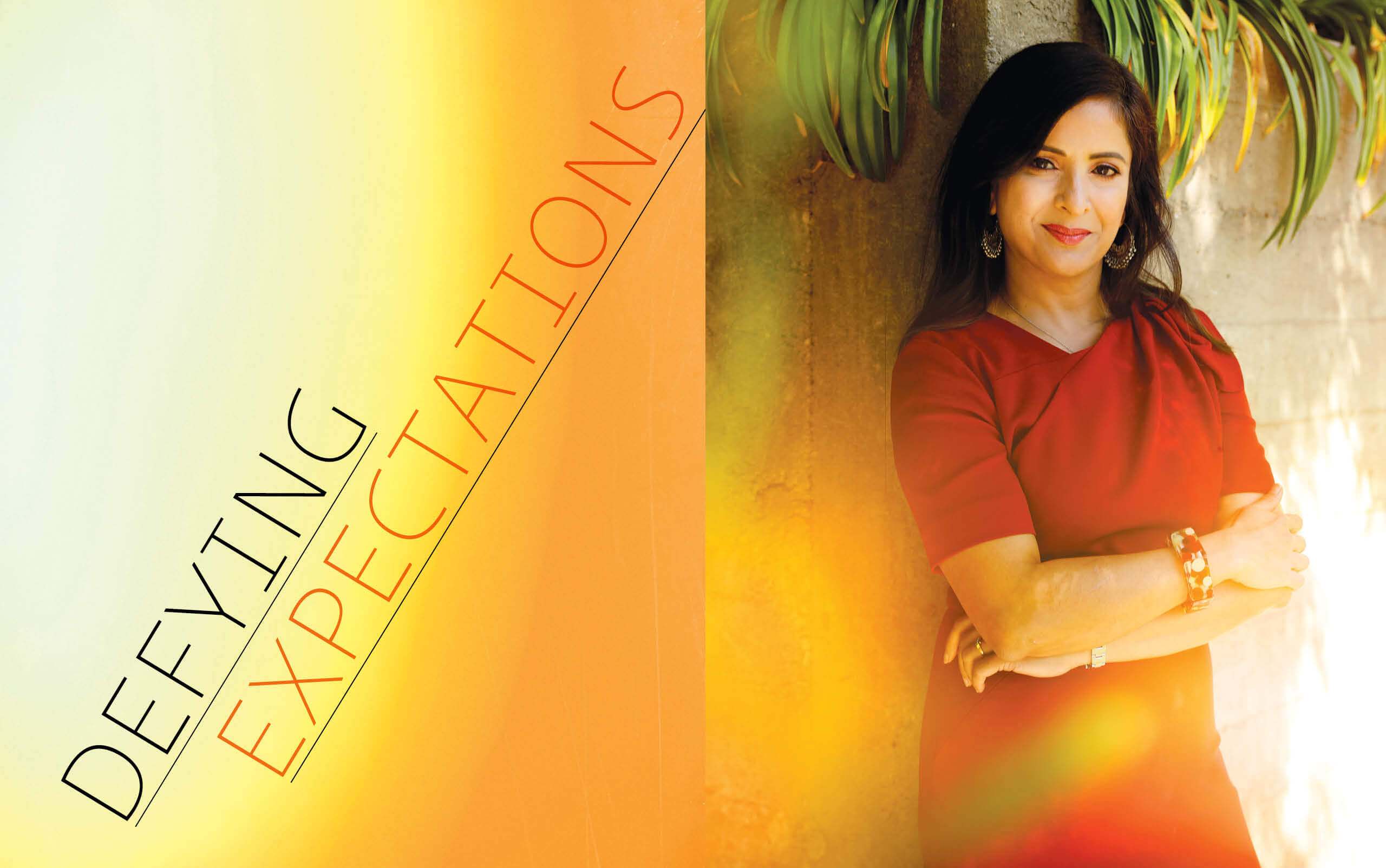HubSpot CEO Yamini Rangan, MBA 03, adapts to even the most destabilizing challenges with a calm confidence.
Yamini Rangan’s time at HubSpot has not been what she expected. Currently CEO, she joined the customer relationship management company in early 2020 as its first chief customer officer, only to have the pandemic hit. “I had barely gotten out of my onboarding period,” recalls Rangan, MBA 03. “And it was clear that whatever we thought we needed to accomplish over a period of time, we needed to get done immediately.”
The HubSpot team aimed to help small and medium-sized businesses through the uncertainty of the pandemic by making its entry-level product easier to use and more economically accessible. “We found that not only were customers able to continue using our product, but they bought more of it,” says Rangan. The changes HubSpot made in a matter of days that March continued to drive business growth as the pandemic months ticked by.
A year later, another surprise development: HubSpot CEO and co-founder Brian Halligan was injured in a snowmobiling accident and needed time to recover. He asked Rangan to run the company for him. Rangan embraced the challenge, and she was so successful that after six months, Halligan asked Rangan to take the leadership reins permanently. She became CEO in September 2021.
Dealing with the unexpected didn’t destabilize Rangan. She’s no stranger to jumping in and defying expectations, tracing back to her youth growing up in a small town in India where, she says, the bar for women’s achievements was set low. But her parents raised her and her sister to be independent. “My mom fed a ton of ambition as we were growing up,” says Rangan. That ambition guided her to earn a bachelor’s degree at an engineering school in India where fewer than 10% of students were women—who were often treated with hostility. She turned the antagonism she encountered into motivation to be the best engineer possible.

Fresh from college, Rangan moved to the U.S. by herself to pursue a master’s degree in engineering at Clemson University. Suddenly, 21-year-old Rangan was on her own in South Carolina, thrust into a constant cycle of unlearning and relearning.
“I grew up in a society where women were on mute,” says Rangan. “Now, half of my class grades came from participation. I would literally write down exactly what I was going to say in class the next day.” That system worked great unless a classmate beat her to her point, forcing Rangan to reformulate her input on the fly. It was a crash course in adaptability.
Rangan spent the first five years of her post-Clemson career as an engineer but realized that her interest lay less in hands-on engineering and more in communicating the value and vision of technology. By then married and living in the Bay Area, she pursued a Berkeley MBA to help her transition to business.
“The way I got here was persevering, doubling down, working harder, working longer. That should not have to be the playbook for the next generation of women.”
After earning her degree, Rangan embarked on a career in enterprise software, working in sales and strategy roles at SAP and Siebel for a few years followed by another ten years at cloud-based enterprise platforms, first at Workday where she rose to VP of sales strategy and operations, and then at Dropbox, where she eventually became chief customer officer. All her jobs had one thing in common: customer relationship management (CRM). “What fascinates me is that CRM is always evolving, especially in the B2B world,” she says.
When Rangan started her post-Haas career, CRM was considered a sales tool, she explains, centralizing customer information and contact notes for sellers. “Fast-forward to the cloud era, and it’s all about buyer empowerment,” says Rangan. “If you’re a buyer, you go to a website, maybe you try a product, maybe you already know what product you want to buy. You’ve made a decision before you even talk to anyone in the company. CRM companies now need to enable buyers.” As HubSpot adapts to data shifting ever more toward the buyer, Rangan’s deftness with unlearning and relearning should prove instrumental.
In fact, it is HubSpot’s wholehearted cultural embrace of adaptability and transparency that both drew her to the company and has helped it weather the pandemic. “We went from being office-centric to being hybrid during the last two years, and we’ve hired people globally in places we never could before,” she says. To Rangan, HubSpot’s success during the pandemic era, which saw 2021 revenues climb 47% over 2020, proves that “our values live in our hearts, not our hallways.”

Recognized in 2019 by the San Francisco Business Times as one of the most influential women in business, Rangan understands that being a female CEO of a $21 billion-dollar public company makes her a role model. “There are things that happen to you, and then there are things that happen through you,” she says. “There are still not enough women in leadership positions within technology and other industries. The way I got here was persevering, doubling down, working harder, working longer. That should not have to be the playbook for the next generation of women.”
At HubSpot, developing women leaders means mentorship programs for women and people of color, targeted workshops and community for women employees at the director level and above, and an active Women@HubSpot employee resource group of which Rangan is co-executive sponsor. The company’s ongoing commitment to supporting diversity in the workplace, where women currently comprise 46% of the global employee count, rises to its highest levels: 70% of HubSpot’s board of directors identify as a woman or person of color, and three other women share HubSpot’s C-suite with Rangan.
To someone accustomed to defying expectations, the wisdom of building a heterogeneous workforce is easy to accept. “The best products are built by teams that deeply understand their customers,” Rangan says. “And customers are diverse. How in the world can you build a product without having that level of diversity within your own teams?”
